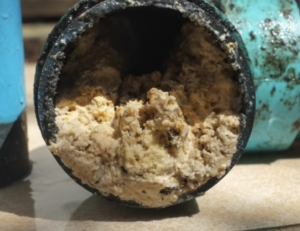
(Batesville, IN) – The Batesville Water Utility is waging war on “fatbergs.”
It’s a relatively new and unpleasant phenomenon that city officials say is an expensive issue for sewage management and wastewater departments everywhere.
A fatberg (pictured) is a hard clump of fibers, fat, and oils that collect in sewage systems and have become more common because of the dramatic increase in the use of disposable wipes.
You might be wondering how disposable wipes could cause a problem when they often have the word “Flushable” emblazoned on the front of their packaging.
The reality is that disposable wipes are flushable in the same way that strips of fabric from an old t-shirt are flushable. They can be put in the toilet and go down, but they are not flushable by the definition of “Things you should flush down your toilet, things that the sewage system can handle, and things that don’t cause problems”.
Why Are Flushable Wipes An Issue?
Toilet paper breaks down in water. This is good because there are all sorts of pumps and grinders between your house and the treatment facility that can handle paper that’s already dissolving in the water.
But wet wipes are wet, and do not fall apart like normal paper. So instead of dissolving, wipes shred into long strings that get tangled in pumps, get caught in the pipes, and accumulate gunk – mainly fats and oils – that does not dissolve in water.
The fibrous mass of “flushable” wipes gives the fats and oils a place to collect, which invites more and more to clump together until you get a fatberg which solidifies into a solid clump clogging
up the sewer system and breaking pumps that keep the sewage flowing.
City officials say these clogs can lead to backups in your home, or damage to public pumping equipment that can increase everyone’s sewer bills.
Several pumps in Batesville have been replaced this year as a result.
How to dispose of wet wipes?
To ensure disposed wet wipes cause the least amount of damage to the city’s sewers, you’re urged to refrain from flushing the items. Instead, the Environmental Protection Agency advises dropping the wipes in a trash can along with other cleaning items, paper towels and rags.



